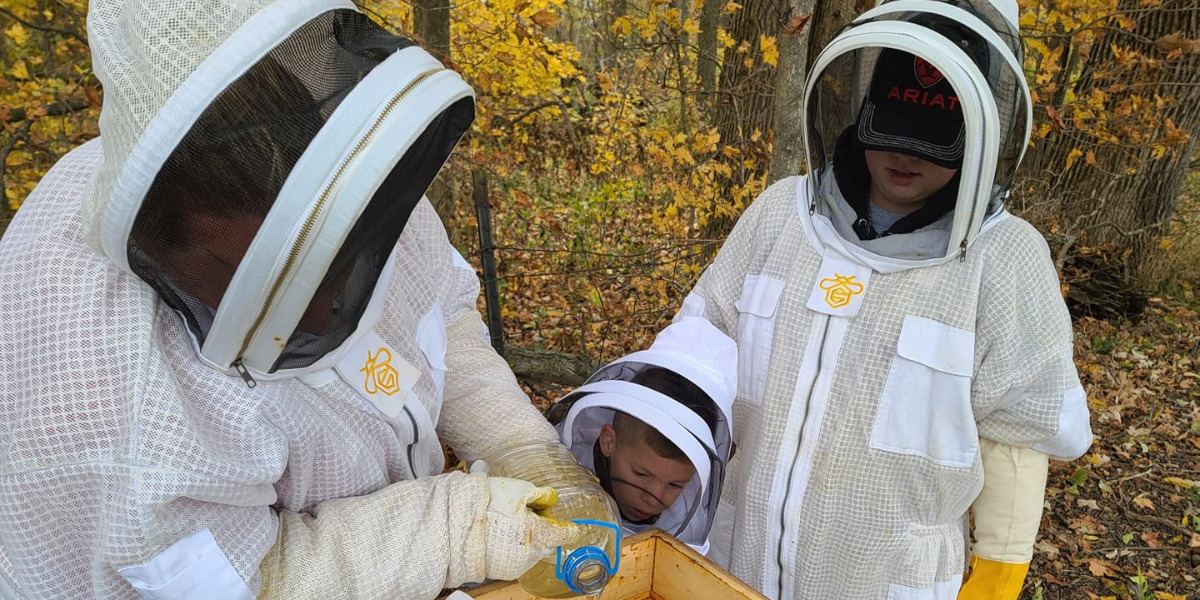Beekeeping is an age-old practice that offers a glimpse into the world of these insects. Caring for bees is a fun hobby that lets you connect with nature in unique ways and brings rewards. Beekeeping is more than making honey. It helps people learn to value nature as a whole. Beekeeping has something for everyone, whether you like honey, want therapeutic benefits, or care about the environment. It is a rewarding hobby with many benefits.
What Do Beekeepers Do?
A typical day for beekeepers depends on the season. Another factor new beekeepers must research is the specifics of the region where the bees are kept. Beekeepers in southeast Georgia may have to take fewer precautions than someone farther north.
While many new beekeepers might set the start of the season in spring, experienced beekeepers know that winter should be considered the start. For beekeepers, winter is the ideal time to gather the supplies to build hives and acquire all proper tools and accessories. By the beginning of spring, you miss precious time and may discover your bees have disappeared while you wait for your supplies to arrive. For experienced beekeepers, winter is the time to monitor your hives and ensure they are keeping warm. Bees can die if exposed to temperatures below 40 degrees and taking precautions such as never fully opening the hive during feeding to maintain heat.
New beekeepers will find spring to be one of the most hectic times, but it’s also one of the most important. Due to the rapidly shifting weather and the volatile temperature, it’s essential to monitor your bees to ensure that they’re beginning to move with the first nectar flow. Monitor the weather to ensure you’re prepared for sudden freezes, as they can be one of the most dangerous periods for a hive. In southeast Georgia, where temperatures are more moderate, spring is also one of our biggest honey production seasons. This can be aided by pointing your hives east for first light and sooner foraging. Depending on location, summer might be the end of your honey season or it might extend into summer. In southeastern Georgia, we often find it ends right at the beginning of summer and must feed our bees until fall. Pest management is crucial during this time, and sometimes, treatments are needed. This is identified through monitoring the hives throughout the season and requires attention to detail. Watching beginners’ videos can help during the learning process.
As autumn begins, beekeepers begin extracting or harvesting the honey. Pest control is still a factor in the hive’s health, especially during this season. Feeding the bees during Autumn ensures they have enough food stored for the upcoming season. Preparing for winter includes reducing the hive size to avoid heat escaping and keep intruders out of the enclosure.
Educate Yourself for Your New Bees
There are many resources available online or in person that you can start with. You can start with books, articles, or your local bee association. Many beginner-friendly resources will help you with the basics, such as bee biology, hive management, and honey production.
Your local beekeeping group may have meetings and beginner courses to help you learn about bees through hands-on experience. Attending conferences or shadowing experienced beekeepers is a great way to learn more about the tasks of beekeeping.
Embarking on your beekeeping journey is exciting and filled with learning opportunities. Many resources are available to help you learn about bees and become a successful beekeeper. Dive in and gain the knowledge and skills you need:
Beekeeping is both an art and a science, and each keeper’s journey is unique. Embrace the learning possibilities, be curious, and don’t be afraid to make mistakes along the way. As you learn about beekeeping, you can teach others about the importance of bees and pollinators.
Beginner Beekeeping 101
Choosing the Perfect Location
You will need enough space to maintain your hives and plenty of access to water and flowers for your bees to forage on. Before you start beekeeping, check local regulations to make sure it’s allowed in your area. More urban areas may require a permit to house and care for bees.
Selecting the right spot for your beehives is vital for a successful beekeeping operation. By taking the time to find the right location, you will set yourself up for a successful and rewarding journey.
Getting the Right Equipment
Finding the right beekeeping equipment can become overwhelming with all of the options available to you. In the beginning, just focus on the basic stuff that you will need, such as:
- Beekeeping Suits
- Beekeeping Gloves
- Hive Tool
- Smoker
You’ll also need hive components such as hive boxes, frames, foundations, and a bottom board. There are various styles to choose from; do your research to find what will work best for you. Focusing on the essentials and considering factors like quality, cost, and local conditions will help you start confidently.
Package Bees or Nucleus Colonies
Nucleus colonies (Nucs) are an excellent option for beginner beekeepers. They are small colonies that have already been established. They typically include a queen, worker bees, brood, and honey stores. Nucs offer a quicker start compared to Package Bees but may be a more expensive option.
Package bees are a popular choice for beginners. They come in a box with a queen and worker bees to start a new colony in your hive. However, they can be far more likely to leave, which can dishearten newer beekeepers. Packages are much more picky about setup, and unless you have added a frame of drawn comb with open brood and stores in it you may find your new package has absconded.
Setting Up Your Hive
Make sure your beehive is easy to reach for check-ups and repairs and has plenty of room to move around comfortably.
- Place your hive in a location that is sheltered from strong winds and has ample sunlight. After choosing your area, you can assemble and install your new hive.
- Make sure that your hive is easily accessible for regular inspections and maintenance. There should be enough space to work around it comfortably.
- After installing your bees, monitor them closely to ensure that they are settling in well. Look for bees going in and out of the hive with pollen and nectar. This means the colony is healthy and collecting food.
Setting up your first hive is an essential and exciting step in your beekeeping journey. By following all of the steps carefully, you’ll ensure that your bees are set up for success in their new home.
Remember that proper hive setup is crucial for the health and well-being of your bees, so take your time and follow the instructions. Enjoy the experience of welcoming your new bees to their hive.
Hive Management & Care
Conduct regular hive inspections to check on the health of your bees and look for any signs of pests or diseases. You may also need to provide feeding, especially in the early spring or during times of nectar dearth.
Monitor your new hive closely for signs of varroa mites and diseases such as American foulbrood. If you find any signs of these diseases, treat your bees as necessary. Various treatment options, including natural and chemical treatments, are available for managing varroa mites and other pests. Choose a method that is safe and effective for your bees.
To keep your hives healthy, watch for problems, fix them fast, and give your bees good food and care. Stay alert! Healthy bees are happy bees! So, make hive health a priority in your beekeeping practices, and you will enjoy many years of beekeeping bliss.
Harvesting Honey
During the honey flow season, you’ll have the opportunity to harvest honey from your hives. To do this, use a honey extractor to spin out the honey and store it in jars for personal use or sale.
The honey flow season is an exciting time, especially for new beekeepers, as it is the time to harvest delicious honey from your hives. Harvesting honey is one of the great rewards of beekeeping, but it is also an essential part of beekeeping to keep your hive healthy.
Beekeeping works with nature. Taking honey carefully keeps bees healthy for future honey production. So, embrace the honey flow season, savor the sweet reward, and continue to nurture and care for your bees with love.
Join Your Local Beekeeping Association
If you join your local beekeeping association or club, you will create valuable relationships with other beekeepers, especially as a beginner looking for support. You’ll have the chance to gain knowledge from experienced beekeepers, attend workshops, and get support or advice when you need it.
If you are new to beekeeping, joining a local association can help you learn and grow in your beekeeping journey. If you have experience and want to meet others, joining a local association can also be beneficial. It is a great way to connect with fellow beekeepers and expand your knowledge. Joining a local association can provide valuable resources and support for your beekeeping endeavors.
Getting support from other beekeepers can be a pivotal step in your beekeeping journey. Don’t hesitate to reach out and join your local beekeeping association as soon as possible!
Continue Learning & Growing
As a beekeeper, you will quickly learn that beekeeping is a continuous learning journey. It’s crucial to stay informed about the latest techniques, research, and practices. By always being open to learning more, your hive operation will thrive.
When you gain some confidence in the hives, you might expand your apiary. You might do this by adding more hives or experimenting with bee breeds. With the right education, tools, and help, you can start beekeeping and experience the benefits it brings.
Beekeeping is a hobby that people of all ages and backgrounds can enjoy. They can be interested in producing their honey, helping pollinators, or simply enjoying the fascinating world of bees.
At Guardian Bee Apparel, we strive to provide quality bee suits & apparel for our customers. We understand the passion and dedication that goes into beekeeping. We are committed to supporting beekeepers at every stage of their journey. At Guardian Bee Apparel, we do this by offering high-quality, reliable, and functional beekeeping apparel and equipment. Happy beekeeping!

